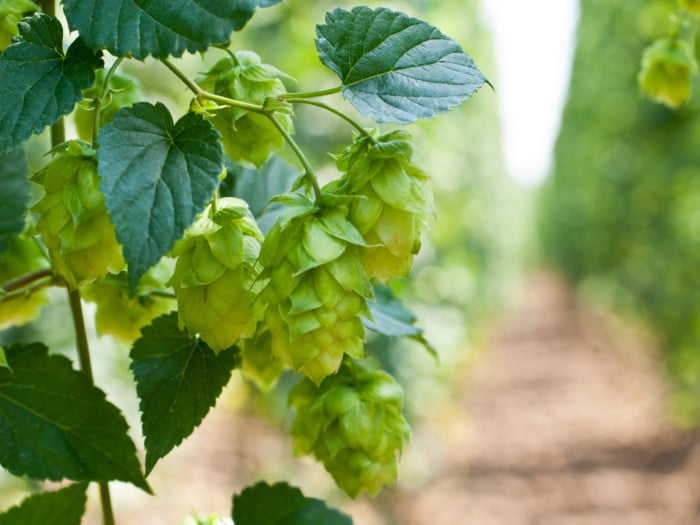Known best for their role in beer production, hops also have a variety of medicinal uses and have played numerous roles throughout history.
What are Hops?
Hops are the seed cones of a perennial herbaceous plant that is scientifically known as Humulus lupulus. Technically the flowers of this plant are cultivated around the world for their seed cones, many varieties of which are used in the brewing of beer. For more than 1,000 years, they have been a key ingredient in this popular alcoholic beverage. Their cultivation has continued to evolve, particularly in recent years, as beer brewing has undergone a veritable Renaissance in some parts of the world. [1]
Not only do these flowers act as a stabilizing agent in beer, but also provides different flavors, and some antibacterial and antioxidant protection to the beverage during production. While hops are found in almost all beer, they are not considered one of the essential ingredients – e.g., yeast, water, malted barley. However, they do act as a preservative and stabilizer in beer, so they are almost always included. The inclusion of malt gives a sweetness to the beer, whereas these seed cones can add bitterness and balance the flavor in various ways. [2]

Hops are used to balance the flavor in beer. Photo Credit: Shutterstock
Nutrition
Nutritionally speaking, hops don’t contain a wealth of nutrients, but they do have notable levels of vitamin B6, vitamin C, and vitamin E, as well as a variety of antioxidant flavonoids, including a unique compound named xanthohumol. [3]
Hops Health Benefits
The health benefits of hops in various forms include relaxing the muscles, boosting cognitive health, easing cardiovascular issues, and protecting skin health, among others.
- Relieve symptoms of insomnia
- Treat arthritis and fibromyalgia
- Ease the transitional hormone changes of menopause
- Aid in weight loss
- Soothe toothaches
- Reduce pain in sore joints and muscles [4]
- Minimize the severity of menstrual cramps and other symptoms, such as mood swings
- Manage diabetic symptoms
- Treat ulcers
- Help to calm anxiety
- Relax the muscles and prevent tension headaches
- Increase blood flow and boost cognitive function
- Prevent hair loss and dryness of the scalp, which can lead to dandruff
- Boost skin health by eliminating inflammation
Uses
There are quite a few uses for hops outside of brewing beer, such as in extract form or various capsules.
- Extract: The extract from hops can be used for their sedative nature, and is often used as a sleep aid.
- Tincture: You can add 10-15 drops of this tincture into the water to improve mood and relax the body.
- Tea: Brewing dried hops in hot water creates a bitter tea that can ease headaches and reduce pain.
- Beverages: When brewed in beer, some of the active ingredients are compromised, but they can soothe anxiety. [5]
- Tablets: A more concentrated way of benefitting from these flowers – tablets can contain up to 350 milligrams and may be recommended to be taken twice daily.
Side Effects
There are various side effects of consuming hops or using products that are derived from these seed cones. Furthermore, the essential oil is very potent and can cause more severe side effects when used improperly or in excess.
- Pregnant women and breastfeeding women should avoid use, as the effects are largely unknown. Also, women should limit or completely eliminate alcohol consumption during pregnancy.
- Allergic reactions to hops do exist, which can lead to an upset stomach, vomiting or diarrhea, as well as topical inflammation if you are using them in a tincture form on your skin.
- drowsiness can occur when hops are used. Remember to only use these products or remedies in moderation.
